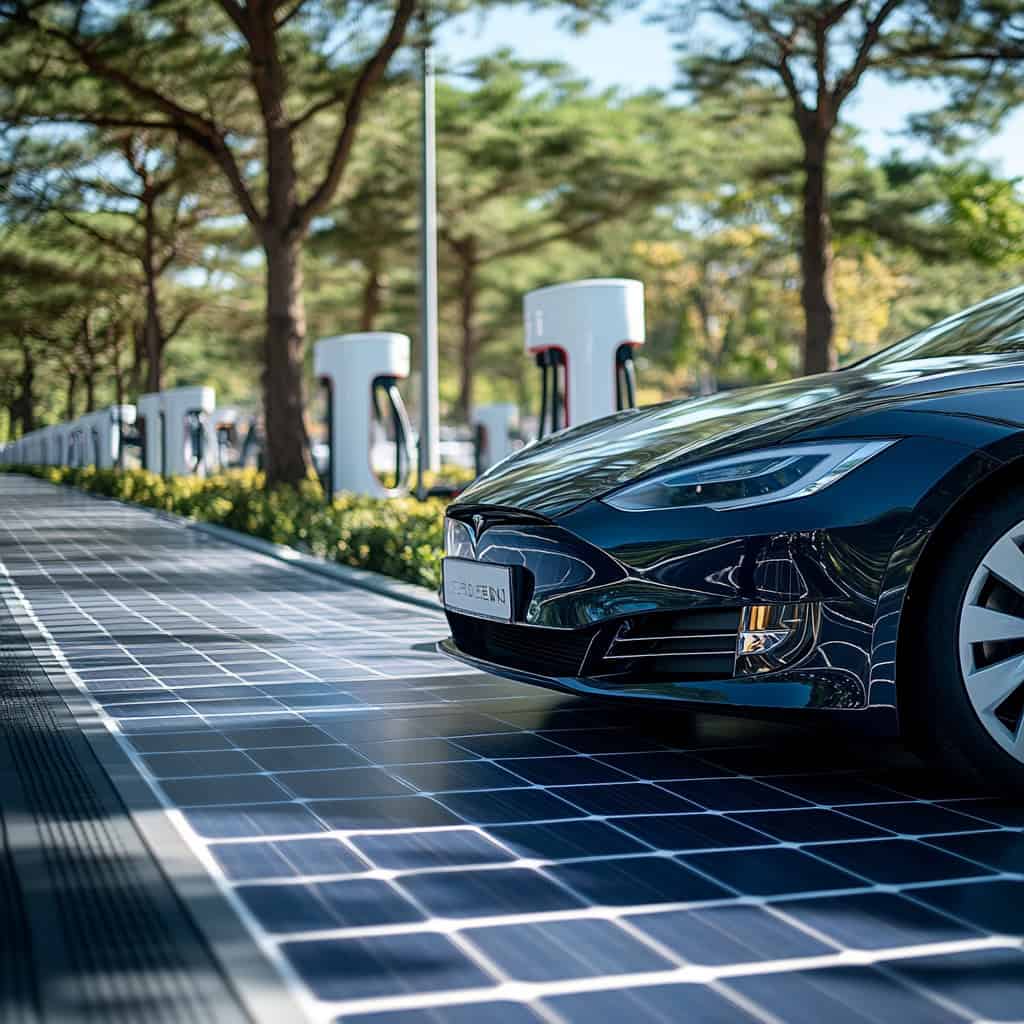As the world moves toward cleaner and more sustainable transportation, electric vehicles (EVs) play a key role. They help reduce greenhouse gas emissions and our reliance on fossil fuels.
However, the sustainability of EVs is significantly influenced by the source of their electricity. Solar powered EV charging presents a groundbreaking solution by integrating renewable energy into the transportation ecosystem, ensuring a cleaner and more efficient future.
The Role of Solar Energy in EV Infrastructure
The increasing adoption of EVs has prompted the need for an expanded and reliable charging infrastructure. Traditional grid powered EV charging stations rely on electricity that may still come from fossil fuel sources.
By integrating solar energy into charging infrastructure, we can significantly reduce the carbon footprint associated with electric vehicle usage. Solar panels can be set up at home or at charging stations.
Growth and Expansion of Solar-Powered EV Charging
The global demand for sustainable energy has led to the growth of solar-powered EV charging stations. These stations are found in cities, along motorways, and in rural areas.
Governments and private entities are investing heavily in infrastructure that integrates solar energy, leading to the rapid expansion of this technology.
Solar canopies, parking lot solar panels, and special solar farms for EV charging are becoming more common. They provide clean energy for vehicles and help reduce the use of non-renewable sources.

Sustainability and Environmental Benefits
- Reduction in Carbon Emissions
Unlike conventional power sources, solar energy is completely renewable and does not produce greenhouse gas emissions. By leveraging solar-powered charging, EV owners can further decrease their carbon footprint. Studies indicate that EVs charged with solar energy contribute significantly less to air pollution compared to those powered by grid electricity derived from fossil fuels.
- Decreased Dependence on the Grid
With solar-powered EV charging, there is less reliance on centralised power grids, which are often subject to energy demand fluctuations and outages.
This also helps reduce strain on the existing electricity infrastructure, making the power supply more resilient and reducing the likelihood of grid failures.
- Lower Operating Costs
Solar energy is free after the initial investment in photovoltaic (PV) panels. This can lead to significant cost savings for both individuals and businesses over time, as they are less affected by fluctuating electricity prices.
Solar-powered EV charging stations can also offer lower charging rates compared to traditional charging stations, making EV ownership more affordable.
- Scalability and Accessibility
Solar-powered EV charging stations can be set up in remote areas. These places often lack traditional power grid connections. This expands the reach of EV infrastructure and promotes accessibility to clean energy solutions worldwide.
In many developing regions, solar-based charging solutions provide a practical alternative to expensive and unreliable electricity grids.

Technological Innovations and Integration
Several advancements in solar and energy storage technologies are making solar-powered EV charging more feasible and efficient:
Smart Charging Systems
Smart charging systems optimise charging times based on solar energy availability and EV battery demand, improving efficiency. These systems use AI-driven analytics to predict peak solar generation hours and align charging schedules accordingly, minimising waste and maximising sustainability.
Battery Storage Solutions
Integrating energy storage with solar charging stations ensures that surplus solar energy can be stored and used during non-sunny hours, providing round the clock clean energy for EVs. Battery technologies such as lithium-ion and solid-state batteries are being increasingly adopted to enhance energy retention and distribution.
Bidirectional Charging (V2G)
Vehicle to grid (V2G) technology enables EVs to supply excess stored energy back to the grid, further supporting energy sustainability. By acting as mobile energy storage units, EVs can contribute to grid stabilisation and enhance the overall efficiency of energy distribution.
Economic and Policy Incentives
Governments worldwide are recognising the importance of solar-powered EV charging and are implementing policies to encourage its adoption.
Tax Incentives and Rebates
Many governments provide tax incentives, rebates, and grants for the installation of solar-powered charging stations. These incentives help offset the initial investment costs and accelerate infrastructure deployment.
Renewable Energy Mandates
Policies requiring a certain percentage of energy generation to come from renewable sources are driving the expansion of solar-powered EV charging. Many countries have set ambitious targets to reduce their dependence on fossil fuels and transition to sustainable energy solutions.
Corporate Investments and Public-Private Partnerships
Major corporations and startups are investing in solar-powered EV charging infrastructure, recognising its long-term economic and environmental benefits. Public-private partnerships are fostering innovation and accelerating the growth of this sector.
Challenges and Future Outlook
While solar-powered EV charging presents a promising future, several challenges must be addressed:
High Initial Investment
The upfront cost of solar panels and battery storage systems can be a barrier for widespread adoption. However, decreasing costs due to advancements in solar technology and government incentives are making these investments more accessible.
Weather Dependency
Solar energy production varies with weather conditions, making consistent energy availability a challenge without adequate storage solutions. To mitigate this, hybrid charging stations combining solar, wind, and grid power are being developed to ensure continuous energy supply.

Space Constraints
Installing solar panels requires sufficient space, which may not always be feasible in urban environments. Innovative solutions such as vertical solar panels, solar-integrated windows, and shared community solar farms are addressing this challenge.
Grid Integration and Load Management
As solar-powered EV charging expands, ensuring grid stability and effective load management becomes critical. Smart grids, demand response strategies, and decentralised energy production models are being implemented to balance energy supply and demand efficiently.
Conclusion: A Sustainable Path Forward
Solar-powered EV charging represents a transformative step toward a sustainable future in transportation. By leveraging the power of the sun, we can significantly reduce the carbon footprint of EVs, enhance energy independence, and create a more resilient and cost-effective charging infrastructure.
As solar technology continues to evolve and integrate with advancements in battery storage, smart grids, and V2G systems, the vision of a clean, renewable-powered transportation ecosystem is becoming a reality.
The collective efforts of governments, businesses, and individuals will determine how rapidly we can transition to a world where solar-powered EV charging is the norm, driving us toward a cleaner and greener future.

